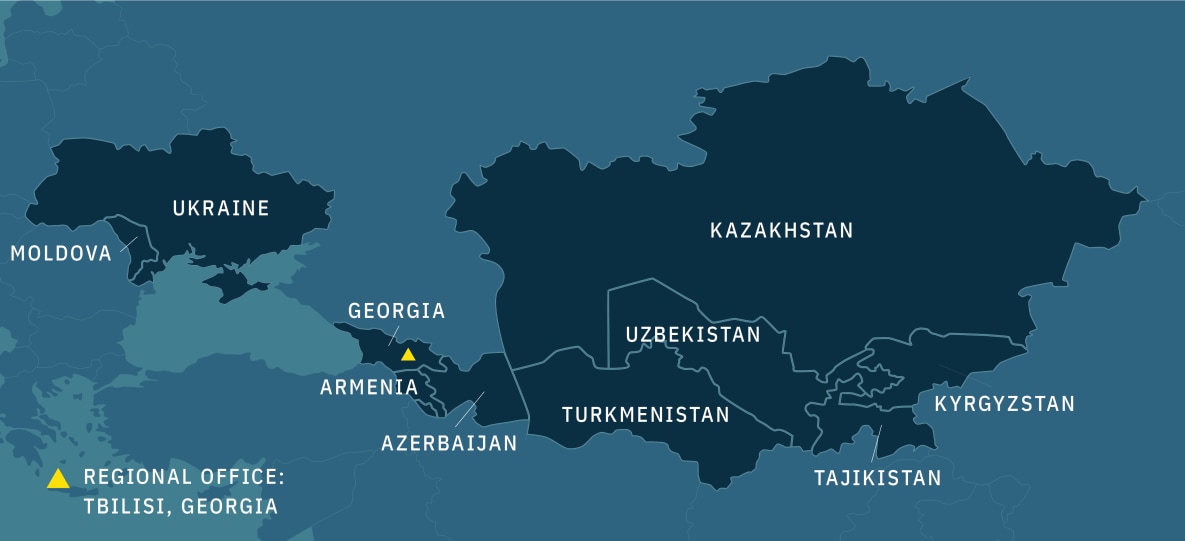CDC’s Eastern Europe and Central Asia Regional Office

At a Glance
Established in 2021, U.S. CDC’s Eastern Europe and Central Asia (EECA) Regional Office, located in Tbilisi, Georgia, builds on decades of diplomatic relations, public health collaborations, and CDC investments across the region. In deploying health security expertise, U.S. CDC works to advance regional stability, promote foreign policy imperatives to strengthen institutions, promote science, accelerate transitions to sound governance, and counter misinformation.
Overview
The EECA Regional Office is home to approximately 135 million people and covers an area roughly half the size of the United States. This region consists of various CDC assets, including the CDC regional office and five bilateral CDC country offices. The EECA Regional Office provides technical support for programming in ten countries, all of which were a part of the former Soviet Union. The Soviet legacy has resulted in many shared historical, cultural, and bureaucratic characteristics. The geopolitical tensions, most significantly driven by the war in Ukraine, have driven increased volatility across the region.
The EECA Regional Office was established in 2021 and is located in Tbilisi, Georgia. The United States Government and CDC have benefited from 30 years of diplomatic relations and over 20 years of public health collaboration across the region. As national health systems across the region continue to emerge from Soviet legacy models for public health services, functions, and workforce development, there is a need for support. This support is essential for robust health security programing to prevent, detect, and respond to the next global health threat. By deploying CDC’s health security expertise in the region, the success of public health programs will advance regional stability, promote foreign policy imperatives to strengthen institutions, promote science, accelerate transitions to sound governance, and counter misinformation.
-
- Armenia
- Azerbaijan
- Georgia
- Kazakhstan
- Kyrgyzstan
- Moldova
- Tajikistan
- Turkmenistan
- Ukraine
- Uzbekistan
CDC teams are focused on building core public health capacities and capabilities to respond to public health threats. This collaborative effort is done with our ministry counterparts and partners through a cohesive agency-wide Global Health Strategy and advances health security in the region. In addition to personnel in the region, subject matter experts at CDC headquarters in Atlanta, GA, provide technical support to these offices, as well as to partners across the region.
Key Areas of Focus
Reflecting U.S. CDC’s Global Health Strategy, EECA is focused on responding to health threats in the region by building core public health capacities in:
- Antimicrobial resistance
- Hepatitis C elimination
- Pandemics and emerging disease threats
- Laboratory systems and quality assurance
- Genomic sequencing capacity
- Infectious disease surveillance
- Countering misinformation and disinformation
- Workforce development initiatives
- Data modernization
- HIV/AIDS
U.S. CDC and partners are collaborating to:
- Provide regionally relevant strategic coherence and a One-CDC integrated approach with resource mobilization, planning and support for execution
- Enhanceexisting and develop new partnerships to improve health security coordination, collaboration, and communication
- Enhanceand expand public health and cross-sectoral, multidisciplinary workforce
- Ensure ability of the region to effectively respond to public health emergencies, including the rising threat of antimicrobial resistance and the effects of regional conflicts that amplify these threats.
- Support improvements of national public health institutions
- Strengthen public health and clinical laboratories serving human and animal sectors
- Strengthen surveillance systems to understand disease trends and detect public health threats